

It’s All Your Fault: High Conflict People
TruStory FM
Hosted by Bill Eddy, LCSW, Esq. and Megan Hunter, MBA, It’s All Your Fault! High Conflict People explores the five types of people who can ruin your life—people with high conflict personalities and how they weave themselves into our lives in romance, at work, next door, at school, places of worship, and just about everywhere, causing chaos, exhaustion, and dread for everyone else.
They are the most difficult of difficult people — some would say they’re toxic. Without them, tv shows, movies, and the news would be boring, but who wants to live that way in your own life!
Have you ever wanted to know what drives them to act this way?
In the It’s All Your Fault podcast, we’ll take you behind the scenes to understand what’s happening in the brain and illuminates why we pick HCPs as life partners, why we hire them, and how we can handle interactions and relationships with them. We break down everything you ever wanted to know about people with the 5 high conflict personality types: narcissistic, borderline, histrionic, antisocial/sociopath, and paranoid.
And we’ll give you tips on how to spot them and how to deal with them.
They are the most difficult of difficult people — some would say they’re toxic. Without them, tv shows, movies, and the news would be boring, but who wants to live that way in your own life!
Have you ever wanted to know what drives them to act this way?
In the It’s All Your Fault podcast, we’ll take you behind the scenes to understand what’s happening in the brain and illuminates why we pick HCPs as life partners, why we hire them, and how we can handle interactions and relationships with them. We break down everything you ever wanted to know about people with the 5 high conflict personality types: narcissistic, borderline, histrionic, antisocial/sociopath, and paranoid.
And we’ll give you tips on how to spot them and how to deal with them.
Episodes
Mentioned books
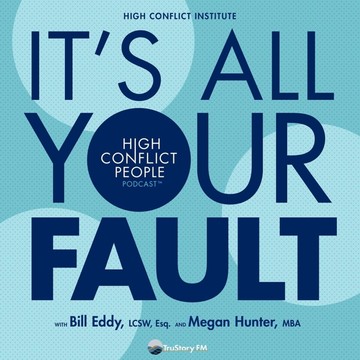
9 snips
Mar 10, 2022 • 32min
Is Putin a Malignant Narcissist? If So, Can We Predict His Future Actions?
Dive into the psyche of Vladimir Putin as the hosts explore the concept of malignant narcissism through the lens of his actions in Ukraine. They dissect Putin's manipulative tactics, long-term planning, and the dangers of his unpredictability. The discussion also touches on the ethical dilemmas of diagnosing public figures and the impact of global governance weaknesses. With insights on managing high-conflict leaders, they emphasize the importance of strong leadership and international solidarity against aggression.
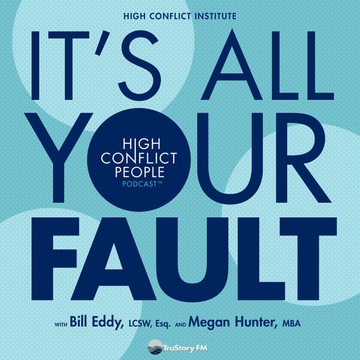
Mar 3, 2022 • 33min
Using Empathy, Attention and Respect to Calm Current Conflicts
Discover the power of EAR Statements—brief phrases that convey Empathy, Attention, and Respect—designed to calm conflicts. Explore examples from 'Sister Wives' to political debates, illustrating how empathy can transform heated conversations. Learn strategies for de-escalating arguments over masks and navigating polarization in society. The hosts share insights on using these techniques in law enforcement and parental alienation cases, emphasizing the importance of sincere communication in bringing people together.
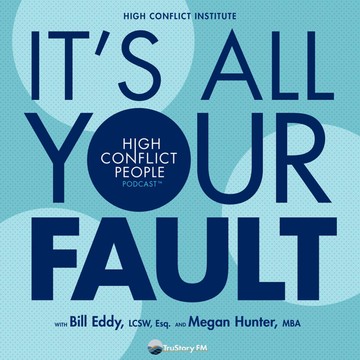
Feb 24, 2022 • 36min
Q&A Lab: Dating Edition
If you are curious about love and romance with challenging – or even toxic – partners, this is your opportunity to hear questions from our listeners and Bill’s and Megan’s answers. In this episode, they answer questions about:partners who make life hell for awhile and then can be okay and very loving for awhileextreme jealousy and whether it’s okay to allow partners to read your private texts and emailsthreats of financial and reputational ruin when the romance is about to endthreats of suicide to prevent a partner from breaking uplack of empathy as a sign of someone with a high conflict personalitywarning signs in the Jodi Arias caseMegan and Bill answer these questions and more in this final episode of the Dating Radar series.Links & Other NotesBOOKSDating Radar: Why Your Brain Says Yes to "The One" Who Will Make Your Life Hell5 Types of People Who Can Ruin Your LifeDATING RADAR TEST & SURVEY RESULTSCOURSEConversations About Domestic Violence in Family Law with 16 Experts: A 6-PART VIDEO SERIES on Domestic Violence (DV) / Intimate Partner Violence (IPV) best practices in the family law environment in the United States and CanadaARTICLESDating Radar: Your X-Ray Vision In A New RelationshipPossible HCP kills former boss, insures lawyer after mediationSubmit a Question for Bill and MeganAll of our books can be found in our online store or anywhere books are sold, including as e-books.You can also find these show notes at our site as well.Note: We are not diagnosing anyone in our discussions, merely discussing patterns of behavior.
(00:00) - Welcome to It's All Your Fault
(01:49) - Dating Radar Q&A
(02:18) - Question 1
(04:47) - Question 2
(10:49) - Question 3
(19:22) - Question 4
(22:40) - Question 5
(26:21) - Question 6
(32:09) - Final Thoughts
(34:03) - Reminders & Coming Next Week: The Current Conflict Atmosphere
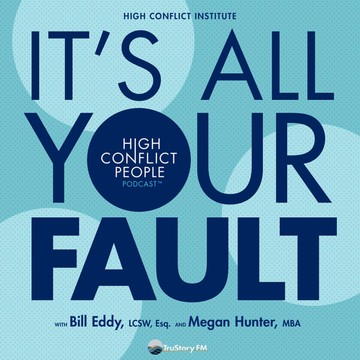
Feb 17, 2022 • 37min
Dating Radar: Your Blind Spots
Watch Those Blind Spots!The very qualities that help us fall in love can at the same time be the on-ramp for the highway to hell. Avoiding a high-conflict relationship requires looking beyond attraction, chemistry, availability & compatibility, and recognizing your own particular blind spots.Bill and Megan talk about three types of ‘blind spot’ fact-finding and how to understand how your vulnerabilities can blind you.Links & Other NotesBOOKSDating Radar: Why Your Brain Says Yes to "The One" Who Will Make Your Life Hell5 Types of People Who Can Ruin Your LifeDATING RADAR TEST & SURVEY RESULTSARTICLESDating Radar: Your X-Ray Vision In A New RelationshipSubmit a Question for Bill and MeganAll of our books can be found in our online store or anywhere books are sold, including as e-books.You can also find these show notes at our site as well.Note: We are not diagnosing anyone in our discussions, merely discussing patterns of behavior.
(00:00) - Welcome to It's All Your Fault
(01:46) - Avoiding Toxic Relationships a
(03:20) - Why Our Brain Says Yes
(04:25) - Low Self-Esteem
(06:03) - Loneliness or Grieving
(08:08) - Naïve Beliefs
(12:36) - Mistaking Warning Signs for Love
(27:18) - Last Thoughts
(34:34) - Reminders & Coming Next Week: Dating Radar Q&As
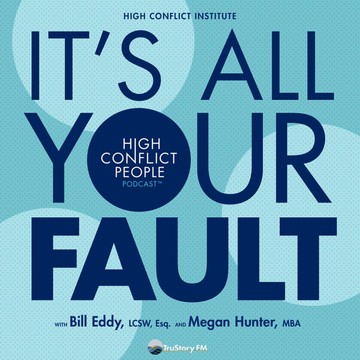
Feb 10, 2022 • 33min
Dating Radar: How HCPs Jam Your Radar
Megan and Bill explore how high conflict personalities (HCPs) can derail relationships, revealing the deceptive nature of initial attractions. They delve into survey findings, highlighting how 77% of respondents felt an instant spark, mistaking it for true compatibility. The duo examines how loneliness can cloud judgment, leading to hasty choices, and discusses the dangers of fake compatibility as HCPs often mirror interests to gain trust. Practical tips on spotting red flags and maintaining healthy skepticism round out this insightful conversation aimed at protecting young daters.
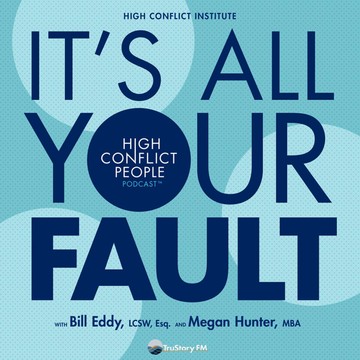
Feb 3, 2022 • 35min
Dating Radar: High Conflict Types You Might Want to Avoid
There are people you shouldn’t marry, have children with, or have a financial entanglement – people with high conflict personalities. They blame, gaslight, lie, deny, make false allegations, and some will seek to destroy you or your reputation.These are relationship destroyers – the people who can ruin your life and make you wish you’d never had children with them.So why do we get involved with them? Why does the brain say ‘yes’ to people who will make your life a living hell? It’s because we don’t have good dating radar and we don’t think we are so stupid that we’d fall into such a horrible relationship.Megan and Bill discuss the five high conflict personality types and how they behave in romantic relationships, including:Borderline HCPsNarcissistic HCPsAntisocial (sociopath) HCPsHistrionic HCPsParanoid HCPsCaveat: Not everyone with these personality disorders has a high conflict personality, but some do. How can you tell? They are the blamers, and they’re no fun in relationships. Listen in as Megan and Bill start this four-part series on Dating Radar.Links & Other NotesBOOKSDating Radar (paperback, audio, e-book)DATING RADAR TEST & SURVEY RESULTSARTICLESDating DenialDating Radar: Your X-Ray Vision In A New RelationshipSubmit a Question for Bill and MeganAll of our books can be found in our online store or anywhere books are sold, including as e-books.You can also find these show notes at our site as well.Note: We are not diagnosing anyone in our discussions, merely discussing patterns of behavior.
(00:00) - Welcome to It's All Your Fault
(02:06) - Dating Radar
(05:31) - What Is an HCP?
(07:16) - Narcissistic Personalities
(09:32) - Borderline Personalities
(14:37) - Histrionic Personalities
(17:06) - Paranoid Personalities
(18:30) - Antisocial Personalities
(21:23) - Overlap
(23:35) - The Survey
(33:43) - Reminders & Coming Next Week: How HCPs Jam Your Radar
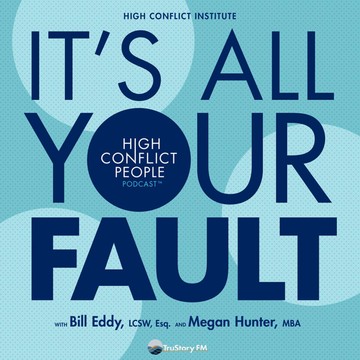
Jan 27, 2022 • 40min
High Conflict Emotion Contagion
The challenge of being emotional creaturesDid you know that emotions are contagious? We like to think we are in complete control of our emotions, but lots of research shows that emotions are contagious and it’s how we handle our own emotions once we’re emotionally hooked.In this episode we’ll break down emotion contagion. If you’re a brain nerd like us, or you simply want to have a better understanding of human behavior and the impact of unmanaged emotions on others, you’ll enjoy this episode. Specifically, we’ll discuss:Can you get emotionally “hooked?” and “unhooked?”How exactly are emotions contagious? How does that work in our brains?Can emotions lead us to make bad decisions?How do High Conflict People deal with emotions?How do High Conflict People communicate differently using their emotions?Are emotions part of why we have such angry polarization today in families and in politics?What can we do to calm down emotionsLinks & Other NotesBOOKSBIFF for everyoneBIFF for Coparent CommunicationBIFF for WorkplaceCalming Upset People with EARON DEMAND COURSEThe Brain 101: For Lawyers & AnyoneWho Are High Conflict People?ARTICLESManaging EmotionsKeep the Conflict Small! (With Managed Emotions)Submit a Question for Bill and MeganAll of our books can be found in our online store or anywhere books are sold, including as e-books.You can also find these show notes at our site as well.Note: We are not diagnosing anyone in our discussions, merely discussing patterns of behavior.
(00:00) - Welcome to It's All Your Fault
(01:42) - Emotionally Hooked & Unhooked
(05:22) - Getting Hooked
(07:16) - Emotional Persuasion
(13:13) - In the Brain
(21:33) - Emotions Leading to Bad Decisions
(24:48) - HCPs Dealing With Emotions
(27:57) - Communicating with Emotions
(29:23) - Polarization
(34:40) - Calming Emotions
(36:46) - Reminders & Coming Next Week: HCPs in Love
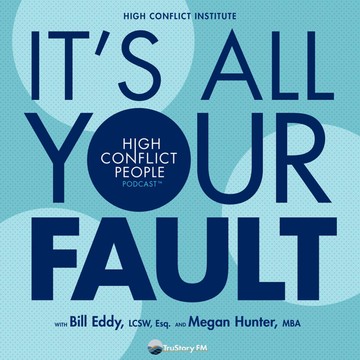
7 snips
Jan 20, 2022 • 30min
Q & A Lab
Curious about high conflict personalities? Learn how to recognize projection in narcissists, especially when they accuse you of being the problem. Discover strategies to manage a complaining boss and turn their focus to solutions. Get insights on how empathy and questions can diffuse workplace tension. Also, find out how to handle extreme accusations from parents without escalating conflict. Equip yourself with practical tools to regain your peace of mind amidst high conflict interactions!
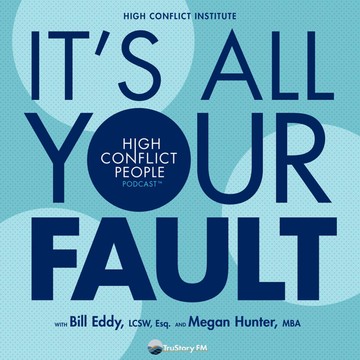
Jan 13, 2022 • 48min
Domestic Violence in Family Law: Part 2
Domestic ViolenceMegan and Bill are joined by the Honorable Karen Adam and Annette Burns to discuss domestic violence. This is part two of this conversation.Links & Other NotesTHE VIDEO THAT WAS DISCUSSED IN THE EPISODEConversations About Domestic Violence in Family Law with 16 ExpertsBIOSBios for Bill Eddy, LCSW, Esq., Honorable Karen Adam, and Annette Burns, J.D.DOMESTIC VIOLENCE EXPERTS INTERVIEWED IN THE VIDEOAbi Ajibolade, Executive Director, The Redwood, Toronto, OntarioAmy G. Applegate, JD, Clinical Professor of Law, Maurer School of Law, Indiana University, Bloomington, IndianaLinda Bortell, PsyD, Clinical Psychologist, Bortell Psychological, Inc., Los Angeles, CaliforniaMelissa Brickhouse-Thomas, LCSW, Manager, Victim Services, Glendale Police Dept., Glendale, ArizonaGabrielle Davis, JD, Legal and Policy Advisor, Battered Women’s Justice Project, Minneapolis, MinnesotaLoretta M. Frederick, JD, Senior Legal & Policy Director, Battered Women’s Justice Project, Minneapolis, MinnesotaAnna Harper-Guerrero, LMSW, Executive Vice President & Chief Strategy Officer, Emerge! Center Against Domestic Abuse, Tucson, ArizonaAmy Holtzworth-Munroe, PhD, Professor of Psychology, Dept. of Psychological & Brain Science, Indiana University, Bloomington, IndianaHilary A. Linton, JD, LLM, Mediator, President, Family Mediation Services (mediate393) Toronto, OntarioJan Maiden, JD, Family Law/Domestic Violence Attorney, Law Office of Jan Maiden, San Diego, CaliforniaWendy Million, City Magistrate, Tucson City Court Domestic Violence Court, Tucson, ArizonaCharles A. Sawchenko, MSW, Police Lieutenant (Ret), Delaware State Police, Dover, DelawareWilliam Spiller, Jr., JD, Family Lawyer and Minor’s Counsel, Law Offices of William Spiller, Jr., Los Angeles, CaliforniaNancy Ver Steegh, MSW, JD, Professor of Law, Mitchell Hamline School of Law, St. Paul, MinnesotaNeil Websdale, PhD, Director, Family Violence Center, Arizona State University, Tempe, ArizonaDavid Wexler, PhD, Director, Relationship Training Institute, San Diego, CaliforniaSubmit a Question for Bill and MeganAll of our books can be found in our online store or anywhere books are sold, including as e-books.You can also find these show notes at highconflictinstitute.com/podcast as well.Note: We are not diagnosing anyone in our discussions, merely discussing patterns of behavior.
(00:00) - Welcome to It's All Your Fault
(01:44) - Part II: Domestic Violence in Family Law
(02:23) - Why Screen Cases for DV
(06:52) - Importance for Courts to See Full Picture
(10:16) - Avoiding Bias
(13:47) - Impacting Cases
(17:42) - Therapists' Role
(22:25) - Mediation
(26:01) - Dealing With Children's Concerns
(34:31) - Parenting Plans
(37:09) - Treatment
(39:14) - Self-Care
(43:50) - If You're Currently in a DV Situation
(45:27) - Coming Next Week: Listener Questions
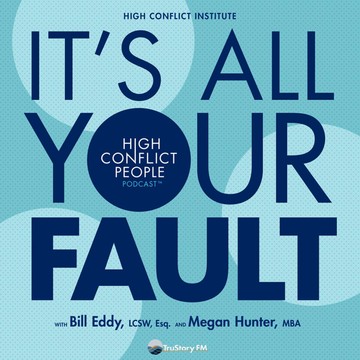
Jan 6, 2022 • 43min
Domestic Violence in Family Law: Part 1
Domestic ViolenceMegan and Bill are joined by the Honorable Karen Adam and Annette Burns to discuss domestic violence. This is part one of this conversation.Links & Other NotesTHE VIDEO THAT WAS DISCUSSED IN THE EPISODEConversations About Domestic Violence in Family Law with 16 ExpertsBIOSBios for Bill Eddy, LCSW, Esq., Honorable Karen Adam, and Annette Burns, J.D.DOMESTIC VIOLENCE EXPERTS INTERVIEWED IN THE VIDEOAbi Ajibolade, Executive Director, The Redwood, Toronto, OntarioAmy G. Applegate, JD, Clinical Professor of Law, Maurer School of Law, Indiana University, Bloomington, IndianaLinda Bortell, PsyD, Clinical Psychologist, Bortell Psychological, Inc., Los Angeles, CaliforniaMelissa Brickhouse-Thomas, LCSW, Manager, Victim Services, Glendale Police Dept., Glendale, ArizonaGabrielle Davis, JD, Legal and Policy Advisor, Battered Women’s Justice Project, Minneapolis, MinnesotaLoretta M. Frederick, JD, Senior Legal & Policy Director, Battered Women’s Justice Project, Minneapolis, MinnesotaAnna Harper-Guerrero, LMSW, Executive Vice President & Chief Strategy Officer, Emerge! Center Against Domestic Abuse, Tucson, ArizonaAmy Holtzworth-Munroe, PhD, Professor of Psychology, Dept. of Psychological & Brain Science, Indiana University, Bloomington, IndianaHilary A. Linton, JD, LLM, Mediator, President, Family Mediation Services (mediate393) Toronto, OntarioJan Maiden, JD, Family Law/Domestic Violence Attorney, Law Office of Jan Maiden, San Diego, CaliforniaWendy Million, City Magistrate, Tucson City Court Domestic Violence Court, Tucson, ArizonaCharles A. Sawchenko, MSW, Police Lieutenant (Ret), Delaware State Police, Dover, DelawareWilliam Spiller, Jr., JD, Family Lawyer and Minor’s Counsel, Law Offices of William Spiller, Jr., Los Angeles, CaliforniaNancy Ver Steegh, MSW, JD, Professor of Law, Mitchell Hamline School of Law, St. Paul, MinnesotaNeil Websdale, PhD, Director, Family Violence Center, Arizona State University, Tempe, ArizonaDavid Wexler, PhD, Director, Relationship Training Institute, San Diego, CaliforniaSubmit a Question for Bill and MeganAll of our books can be found in our online store or anywhere books are sold, including as e-books.You can also find these show notes at highconflictinstitute.com/podcast as well.Note: We are not diagnosing anyone in our discussions, merely discussing patterns of behavior.
(00:00) - Welcome to It's All Your Fault
(01:40) - Dealing With Domestic Violence
(03:27) - Meet Our Guests
(05:24) - Impetus Behind DV Video Series
(06:19) - Overall Objective
(07:31) - Surprises
(08:54) - Karen's Motivation
(12:46) - Survivor vs. Victim
(15:56) - Annette's Motivation
(18:28) - Biggest Issues in Divorce & Co-Parenting
(28:40) - Intimate Partner Violence vs. DV
(30:50) - Coercive Control
(33:20) - HCPs
(40:19) - Last Words
(41:58) - Coming Next Week: Part 2


